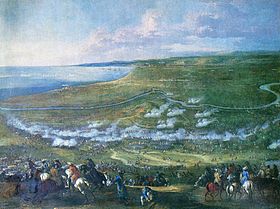Battle of the Volurna
| Battle of the Volurna | |||||||
|---|---|---|---|---|---|---|---|
| Part of the Year of Turmoil | |||||||
 The battle. The city of Trasimene is conspicuous by its absence; the battle actually occurred some way upriver. | |||||||
| |||||||
| Belligerents | |||||||
|
|
| ||||||
| Commanders and leaders | |||||||
|
|
| ||||||
| Strength | |||||||
|
3,000-3,500 men 11 cannon |
7,200 men 24 cannon | ||||||
| Casualties and losses | |||||||
| 1,000-1,500 dead or wounded | 400 dead or wounded | ||||||
The Battle of the Volurna (Amalfitan: Proelium Fluminis Volurnæ) was fought on 24 March 1642 between monarchist and Senatorial troops. The monarchist forces were all that remained of the army that had been victorious at the Battle of the Field of Black Roses two days before, the rest - some eight thousand - having fled after discovering the death of general Ecirius Taranus Roscii, whom they had hailed as king. The Senatorial army had been force-marched from Duderus when news of the storming and coup of the Senate reached the garrison commander, Corsixus Rentius Salrosa, who led three tertiae to subdue the monarchists.
The battle
The battle was brief but decisive. The monarchist army had remained encamped on the plain west of Trasimene, though most of its commanders had deserted around dawn. When Salrosa's troops, coming from the north, crested the hill of Colix in the early afternoon, they quickly deployed their cannons and began bombarding the camp while their infantry marched down in formation. Several commanders attempted to lead their men over the bridge across the Volurna, under heavy cannon fire, and were faced with severe loss of life and large numbers of desertions. One general, Resus Junius Valix, was killed as his men stampeded back across the bridge. The men that reached the north bank attempted and failed to take up formations against the Senatorial tertiae and were quickly overwhelmed. Their casualties climbing, the surviving monarchists surrendered, bringing an end to the Twelve Day's Monarchy.